Assessing willingness to pay for Sharia general insurance in Indonesia: A case study of the Jabodetabek region
DOI:
https://doi.org/10.18326/muqtasid.v15i2.155-170Keywords:
Jabodetabek, quantitative analysis, Sharia general insurance, willingness to payAbstract
This study explores the willingness to pay (WTP) for Sharia general insurance in Jabodetabek, Indonesia, where adoption remains low. The objective is to assess how gender, residence, age, education, occupation, and income influence WTP. Using a quantitative approach, data were collected from 250 respondents through a structured questionnaire. The analysis involved descriptive statistics, cross-tabulation, and chi-square tests. Results indicate that gender, age, and income significantly affect WTP, with higher WTP observed among men, older individuals, and those with higher incomes. Conversely, residence, education, and occupation do not significantly impact WTP. The findings suggest that Sharia insurance providers should tailor products and educational efforts to better align with different demographic groups’ financial capabilities and needs. These insights are crucial for enhancing the adoption of Sharia general insurance in the region.
References
Alam, N., Khan, M. S., Azad, I., Shahid, F., & Dar, A. A. (2024). Identifying the approach to financial sustainability: Navigating the complexities of earning and spending. Edelweiss Applied Science and Technology, 8(4), 995–1006. https://doi.org/10.55214/25768484.v8i4.1477.
Aydin, S., & Cali, M. S. (2023). Analysis of financial capacity of individuals according to demographic and financial profiles. Gazi Journal of Economics and Business, 9(3), 272-291. https://doi.org/10.30855/gjeb.2023.9.3.003.
Bayked, E. M., Assfaw, A. K., Toleha, H. N., Zewdie, S., Biset, G., Ibirongbe, D. O., & Kahissay, M. H. (2024). Willingness to pay for national health insurance services and associated factors in Africa and Asia: A systematic review and meta-analysis. Frontiers in Public Health. https://doi.org/10.3389/fpubh.2024.1390937.
Bucher-Koenen, T., Lusardi, A., Alessie, R., & van Rooij, M. (2017). How financially literate are women? An overview and new insights. Journal of Consumer Affairs, 51(2), 255–283. https://doi.org/10.1111/JOCA.12121.
Daradkah, D., Aldaher, A., & Shinaq, H. (2020). Islamic financial literacy: Evidence from Jordan. Journal Transition Studies Review, 27(2), 131-145. https://doi.org/10.14665/1614-4007-27-2-009.
Dinç, Y., & Jahangır, R. (2024). Differences in perspectives between Islamic and conventional insurance: An argumentative analysis based on risk-sharing and risk transfer concept. Adam Academy Journal of Social Sciences, 14(1), 47-62. https://doi.org/10.31679/adamakademi.1015089.
Hair, J. F., Sarstedt, M., Hopkins, L., & Kuppelwieser V. G. (2014). Partial least squares structural equation modeling (PLS-SEM): An emerging tool in business research. European Business Review, 26(2), 106–121. https://doi.org/10.1108/EBR-10-2013-0128.
Joshi, M. C. (2021). Awareness and preference of rural youth towards financial products. In Management of Industry 4.0: Prospects & Challenges. Available at SSRN: https://ssrn.com/abstract=3759092.
Lubis, R. (2020). Life insurance in positive law and Islamic law in Indonesia. Nurani: Jurnal Kajian Syari’ah dan Masyarakat, 20(2), 307-316. https://doi.org/10.19109/nurani.v20i2.6757.
Mahdiyah, A. N., & Prabawa, S. A. (2024). Pengaruh literasi keuangan terhadap kesejahteraan PNS di kota Bengkulu. El-Mal: Jurnal Kajian Ekonomi & Bisnis Islam, 5(6), 3717-3729. https://doi.org/10.47467/elmal.v5i6.3167.
Mate, A. I., García, I. M., & Suárez, G. R. (2021). Educación financiera y decisiones de ahorro e inversión. un análisis de la Encuesta de Competencias Financieras (ECF). La Comisión Nacional del Mercado de Valores.
Naseri, K., & Sharofiddin, A. (2021). Empirical study on adoption of Islamic banking system using quantitative method a case study of Afghanistan. Turkish Journal of Islamic Economics, 8(2), 571-595. https://doi.org/10.26414/A169.
Nasution, R. R., Sarma, M., & Sukmawati, A. (2023). Faktor-faktor yang memengaruhi pengambilan keputusan terhadap klaim jaminan hari tua. Jurnal Aplikasi Bisnis dan Manajemen (JABM), 9(2), 627-627. https://doi.org/10.17358/jabm.9.2.627.
Rahmat, A. S., Tahier, I., & Duriani, D. (2024). Pengaruh kompensasi dan pengembangan karier terhadap retensi karyawan pada Perumda Air Minum Tirta Latimojong (PAMTL) kabupaten Luwu. Scientific Journal of Reflection: Economic, Accounting, Management and Business, 7(3), 726-738. https://doi.org/10.37481/sjr.v7i3.895.
Raza, S. A., Ahmed, R., & Ali, M., & Qureshi, M. A. (2019). Influential factors of Islamic insurance adoption: An extension of theory of planned behavior. Journal of Islamic Marketing, 11(6), 1497-1515. https://doi.org/10.1108/JIMA-03-2019-0047.
Rifas, A. H., Rahman, A. A., & Buang, A. H. (2023). Appraising the universal concepts of insurance and takaful: Similarities and differences. Umran: Journal of Islamic and Contemporary Affairs, 10(1), 1-15. https://doi.org/10.11113/umran2023.10n1.571.
Robson, J., & Peetz, J. (2020). Gender differences in financial knowledge, attitudes, and behaviors: Accounting for socioeconomic disparities and psychological traits. Journal of Consumer Affairs, 54(3), 813-835. https://doi.org/10.1111/joca.12304.
Rumaf, M. A. N. (2024). Societal behavior towards Islamic insurance: A sociological and anthropological perspective on Sharia economic law. Mu’amalah: Jurnal Hukum Ekonomi Syariah, 3(1), 129-140. https://doi.org/10.32332/muamalah.v3i1.8606.
Sánchez, J. J., Loomis, J., González-Cabán, A., & Holmes, T. (2019, July). A comparison of wildland urban interface households WTP for wildfire risk reduction programs in California and Florida. In International Symposium on Fire Economics, Planning, and Policy: Ecosystem Services and Wildfires.
Sari, S. A. (2024). Pengaruh premi, pengetahuan dan religiusitas terhadap keputusan nasabah berasuransi di PT. Asuransi Jiwa Syariah Al-Amin Jambi. Jurnal Ilmiah Ekonomi Islam, 10(1), 379-388. https://doi.org/10.29040/jiei.v10i1.11258.
Sarıgül, H. (2024). Financial literacy gender gap: A meta-analysis. Sosyoekonomi, 32(61), 97-123. https://doi.org/10.17233/sosyoekonomi.2024.03.06.
Syamsuri, H., Muin, R., & Abdullah, M. W. (2024). Implementation of Sharia insurance in providing sustainable financial protection. Technium Sustainability, 6, 25–37. https://doi.org/10.47577/sustainability.v6i.11150.
Syaputri, W. A., Izzati, S. N., & Arini, Z. V. (2024). Faktor yang mempengaruhi minat generasi milenial dalam menggunakan produk asuransi syari’ah. Syar’Insurance: Jurnal Asuransi Syariah, 10(1), 26-36. https://doi.org/10.32678/sijas.v10i1.10409.
Syuhada, E. F., & Mursyid, M. (2024). Mekanisme asuransi berbasis keuangan syariah. At-Tawazun: Jurnal Ekonomi Syariah, 12(1), 12-22. https://doi.org/10.55799/tawazun.v12i01.367.
Talha, K. M., Waqar, E., Johnson, H. M., Shapiro, M. D., Nambi, V., Virani, S. S., ... & Minhas, A. M. K. (2024). Relationship between race, income-level, and cardiovascular disease. Journal of the National Medical Association, 116(5), 539-552. https://doi: 10.1016/j.jnma.2024.07.115.
Torres, H. A., & Moin, T. (2024). 1039-P: Insurance type, income, and risk for cost-related barriers to care in a national sample of adults with diabetes. Diabetes, 73(Supplement_1). https://doi.org/10.2337/db24-1039-P.
Walczak, D., & Pieńkowska-Kamieniecka, S. (2018). Gender differences in financial behaviours. The Engineering Economics, 29(1), 123–132. https://doi.org/10.5755/J01.EE.29.1.16400.
Wijaya, P. E., & Sugiharto, T. (2024). Produk, harga dan promosi terhadap keputusan pembelian rumah di BTP Residence Bekasi. Journal of Management and Bussines (JOMB), 6(2), 374-383. https://doi.org/10.31539/jomb.v6i2.8503.
Yulianto, A., Wijaya, A. P., Aslikhah, A., Heryanti, Y. T., & Yunita, E. A. (2021). Senior high school student financial literation categorization, do family and school matters? An evidence from Indonesia. Turkish Journal of Computer and Mathematics Education, 12(6), 3593-3598. https://doi.org/10.17762/turcomat.v12i6.7150.
Downloads
Published
How to Cite
Issue
Section
License
Copyright (c) 2025 Rafidah Herawati, Irfan Syauqi Beik, Linda Karlina Sari

This work is licensed under a Creative Commons Attribution-ShareAlike 4.0 International License.







